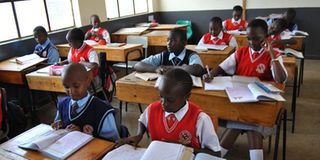Kenyan pupils top in Africa

Photo/FILE
Pupils of St Elizabeth Academy in Karen, Nairobi on January 12, 2011. A new survey shows Kenyan pupils perform better than their counterparts in the region.
Kenyan pupils have been ranked second to those from Mauritius in maths in southern and eastern Africa.
But they lag behind Tanzania, Seychelles, Mauritius and Swaziland in reading skills, according to a report by a regional education coalition.
The Southern and Eastern Africa Consortium for Monitoring Education Quality study involved a sample of 4,436 Class Six pupils in 193 schools across the country.
It was aimed at testing maths and reading achievement in 15 countries of the regional bloc.
The Kenya National Examinations Council, alongside similar agencies in other countries, carried out the survey on behalf of the consortium.
Zambia, Malawi, Namibia, Lesotho and Uganda, in that order, were ranked the worst in maths where the pupils could not solve basic problems in the subject.
Worst performers
Malawi, Zambia, Lesotho, Mozambique and Uganda, again in that order, performed worst in reading skills.
“The quality of education in the 15 countries is still poor despite the cross-regional approaches that the governments have taken to improve standards,” the consortium’s regional boss Demus Makuwa said.
The consortium is a network of ministries of education whose aim is to promote education for all goals and the millennium development goals.
“The quality of education that pupils are getting is now the primary issue,” examination council’s Paul Wasanga said while releasing the results of the survey at Kenya Institute of Education.
“It has now been proven that there is a direct correlation between economic growth and the test scores in schools,” Mr Wasanga added.
The report noted that although education for all can be achieved in the systems of the country, policymakers now needed to worry about “what goes on outside the school.”
On their knowledge of HIV/Aids, pupils from Nairobi were best informed followed by those from Central, Eastern and Nyanza while teachers from the same regions met the desired knowledge of the disease.
But although 98 per cent of teachers had a positive attitude towards pupils infected with HIV, 71 per cent of the teachers had never been tested.
According to Education Minister Sam Ongeri who launched the report, there is a need to monitor quality of education in Kenya especially since the start of free learning.
The minister noted that cases of sexual harassment, bullying and drug abuse were also reported to be on the rise.
“Primary schools are not paying enough attention to the early grades by putting the best teachers in the first grades and ensuring that the ratio of pupils to the teachers is manageable,” he told education officials.




